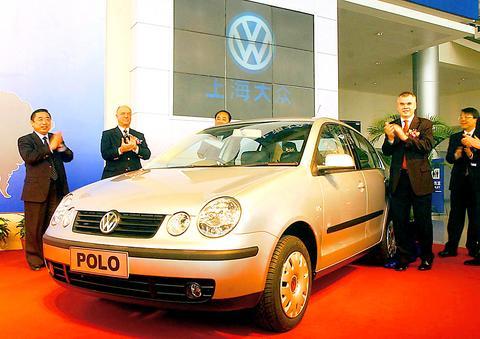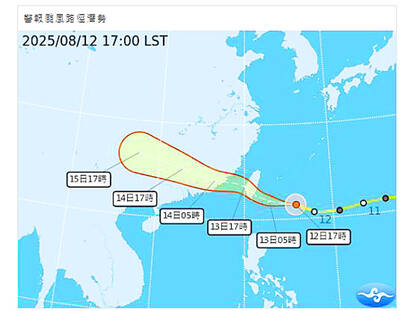In 1984, Volkswagen became the first foreign automaker to invest in China, helping to launch the land of the bicycle into the age of the car.
Now, Volkswagen is helping to pioneer another first -- China as the newest Asian exporter of premium-priced passenger cars to the industrialized world.

PHOTO: AP
VW was preparing Friday for its first made-for-export Polo sedan to roll off an assembly line in Shanghai. The car is destined for sale in Australia.
The step is an unusual one for the growing number of foreign automakers that are setting up operations in China. Most are focusing on China's booming domestic market -- now the fastest-growing in the world. Most have joint ventures on the Chinese, but only a few say they plan to export.
Volkswagen has said it plans to export made-in-China cars to 84 countries within three to five years -- if it can bring down costs and improve quality.
"They've been building capacity and probably want to keep their options open," said Christopher Richter, an auto industry analyst with HSBC Securities in Tokyo. "After all, what if the Chinese economy slows down?"
China has made and exported low-priced trucks, buses and other vehicles for decades -- mostly to other Third World countries. It is also one of the world's biggest auto parts makers.
But so far, the economics of car making in the top ranks of the industry have worked against exports. Car makers import most of their components, and strong demand has kept prices high.
"Everything I've heard suggests that the cost structure in China doesn't make a lot of sense for exporting," said John Bonnell, director of Automotive Resources Asia, an industry consulting firm based in Bangkok.
Quality is another issue.
A batch of subcompact Xiali cars, made by a joint venture between Toyota Motor Corp. and China's Tianjin FAW Xiali Automobile Co, was exported to Mexico last year. But that vehicle does not meet US safety and emissions standards.
General Motors Corp, the world's No. 1 producer, has been selling Chevrolet Venture minivans made at its Shanghai joint-venture factory in the Philippines for two years. But the company says it does not intend to build up export bases here.
"Our focus remains in the China market. China is such a huge market that we could sell all of our output here," said GM spokesman Raymond Chow.
Volkswagen set up its first China venture in 1984, investing US$66 million in a joint venture with Shanghai Automotive Industrial Corp and China National Automotive Industry Corp.
Since then, Volkswagen has spent more than llion (US$1.77 billion) and extended the terms of that 25-year venture by another 20 years.
The German car maker holds about a 38 percent share of China's auto market. Shanghai's taxi fleet is almost entirely composed of locally made VW Santanas.
Volkswagen has come to rely heavily on sales inside China.
According to a recent report by Goldman Sachs, 80 percent of the German carmaker's profits in the first half of the year came from the Chinese market. It recently moved the headquarters of its Asian-Pacific operations to Beijing.
VW's Polo plant is located in Autocity, a 4.4 billion yuan (US$533 million) industrial park in the western suburb of Anting that planners say will eventually be bigger than the auto production zone encircling Toyota's headquarters near Nagoya, Japan.
Volkswagen won't be alone in the export business for long.
Honda Motor Co, which makes Accord sedans in China, is building a plant near the southern city of Guangzhou. It is due to open late next year, turning out subcompact cars for export to Asia and Europe, said company spokesman David Iida.
Honda has not said what it plans to sell or where. But it has emphasized its determination to keep its made-in-China cars at the same level of quality as vehicles it produces elsewhere. It took a 65 percent stake in its Guangzhou venture to ensure it would keep managerial control.
China's own domestic automakers are a jumble of more than 120 small, little-known companies.
Chinese officials say they plan to consolidate those makers into a handful of big industrial groups that can challenge foreign makers for a share of world markets.
But for now, the only makers in China with the technology and size to sell to affluent Western buyers are those with foreign links, said Bonnell, the industry analyst.
"It's going to be the name `Honda,' not `made-in-China,' that sells the cars," he said.

DEFENSE: The first set of three NASAMS that were previously purchased is expected to be delivered by the end of this year and deployed near the capital, sources said Taiwan plans to procure 28 more sets of M-142 High Mobility Artillery Rocket Systems (HIMARS), as well as nine additional sets of National Advanced Surface-to-Air Missile Systems (NASAMS), military sources said yesterday. Taiwan had previously purchased 29 HIMARS launchers from the US and received the first 11 last year. Once the planned purchases are completed and delivered, Taiwan would have 57 sets of HIMARS. The army has also increased the number of MGM-140 Army Tactical Missile Systems (ATACMS) purchased from 64 to 84, the sources added. Each HIMARS launch pod can carry six Guided Multiple Launch Rocket Systems, capable of

Tropical Storm Podul strengthened into a typhoon at 8pm yesterday, the Central Weather Administration (CWA) said, with a sea warning to be issued late last night or early this morning. As of 8pm, the typhoon was 1,020km east of Oluanpi (鵝鑾鼻), Taiwan’s southernmost tip, moving west at 23kph. The storm carried maximum sustained winds of 119kph and gusts reaching 155kph, the CWA said. Based on the tropical storm’s trajectory, a land warning could be issued any time from midday today, it added. CWA forecaster Chang Chun-yao (張竣堯) said Podul is a fast-moving storm that is forecast to bring its heaviest rainfall and strongest

GET TO SAFETY: Authorities were scrambling to evacuate nearly 700 people in Hualien County to prepare for overflow from a natural dam formed by a previous typhoon Typhoon Podul yesterday intensified and accelerated as it neared Taiwan, with the impact expected to be felt overnight, the Central Weather Administration (CWA) said, while the Directorate-General of Personnel Administration announced that schools and government offices in most areas of southern and eastern Taiwan would be closed today. The affected regions are Tainan, Kaohsiung and Chiayi City, and Yunlin, Chiayi, Pingtung, Hualien and Taitung counties, as well as the outlying Penghu County. As of 10pm last night, the storm was about 370km east-southeast of Taitung County, moving west-northwest at 27kph, CWA data showed. With a radius of 120km, Podul is carrying maximum sustained

TRAJECTORY: The severe tropical storm is predicted to be closest to Taiwan on Wednesday and Thursday, and would influence the nation to varying degrees, a forecaster said The Central Weather Administration (CWA) yesterday said it would likely issue a sea warning for Tropical Storm Podul tomorrow morning and a land warning that evening at the earliest. CWA forecaster Lin Ting-yi (林定宜) said the severe tropical storm is predicted to be closest to Taiwan on Wednesday and Thursday. As of 2pm yesterday, the storm was moving west at 21kph and packing sustained winds of 108kph and gusts of up to 136.8kph, the CWA said. Lin said that the tropical storm was about 1,710km east of Oluanpi (鵝鑾鼻), Taiwan’s southernmost tip, with two possible trajectories over the next one